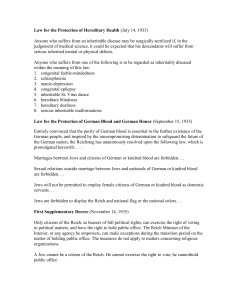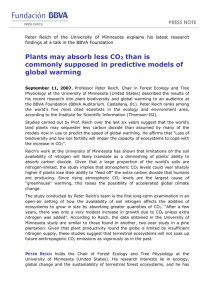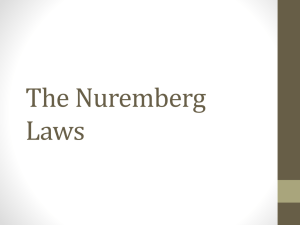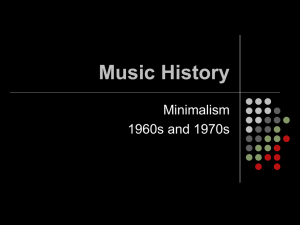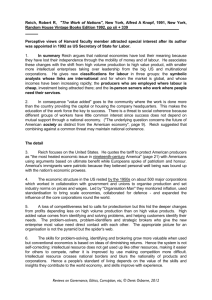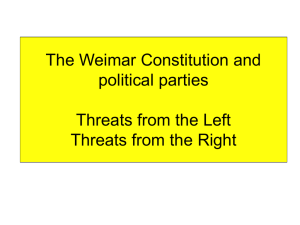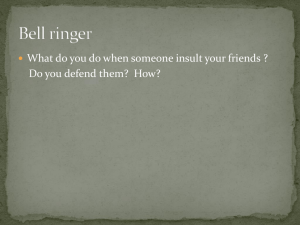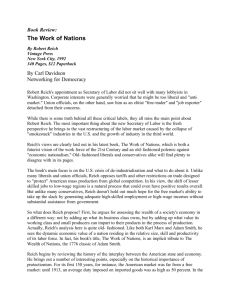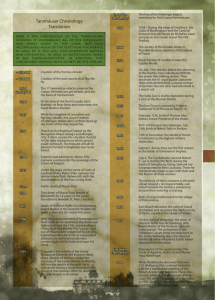Weimar Republic DBQ outline
advertisement
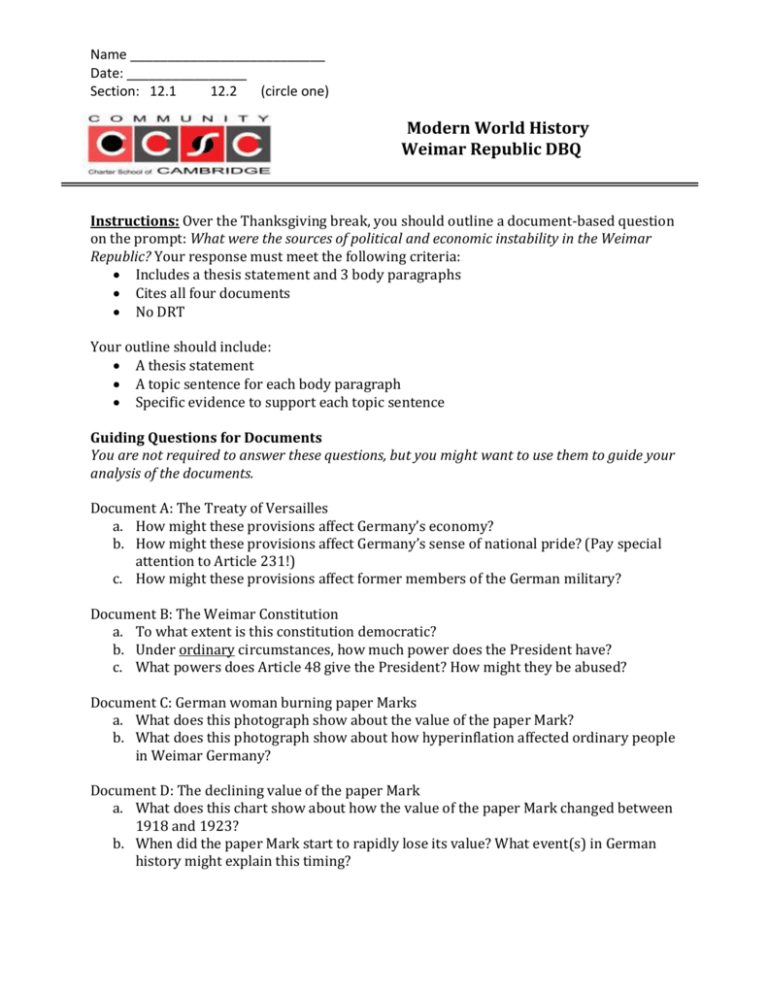
Name __________________________ Date: ________________ Section: 12.1 12.2 (circle one) Modern World History Weimar Republic DBQ Instructions: Over the Thanksgiving break, you should outline a document-based question on the prompt: What were the sources of political and economic instability in the Weimar Republic? Your response must meet the following criteria: Includes a thesis statement and 3 body paragraphs Cites all four documents No DRT Your outline should include: A thesis statement A topic sentence for each body paragraph Specific evidence to support each topic sentence Guiding Questions for Documents You are not required to answer these questions, but you might want to use them to guide your analysis of the documents. Document A: The Treaty of Versailles a. How might these provisions affect Germany’s economy? b. How might these provisions affect Germany’s sense of national pride? (Pay special attention to Article 231!) c. How might these provisions affect former members of the German military? Document B: The Weimar Constitution a. To what extent is this constitution democratic? b. Under ordinary circumstances, how much power does the President have? c. What powers does Article 48 give the President? How might they be abused? Document C: German woman burning paper Marks a. What does this photograph show about the value of the paper Mark? b. What does this photograph show about how hyperinflation affected ordinary people in Weimar Germany? Document D: The declining value of the paper Mark a. What does this chart show about how the value of the paper Mark changed between 1918 and 1923? b. When did the paper Mark start to rapidly lose its value? What event(s) in German history might explain this timing? Document A: Excerpts from the Treaty of Versailles (signed June 28, 1919) Articles 27-41: The western boundaries of Germany are redefined. Article 42: “Germany is forbidden to maintain or construct any fortifications on the left bank of the Rhine [a river near the border between Germany and France] or on the right bank to the west of a line drawn fifty kilometers to the East of the Rhine.” Article 45: “As compensation for the destruction of the coal mines in the north of France and as partial payment towards the total reparation [war damages] due from Germany.... Germany cedes to France...the coal mines situated in the Saar Basin.” After fifteen years, the inhabitants of this region may vote to return to German control. Article 51: “The territories [Alsace and Lorraine] which were ceded to Germany [at the end of the Franco-Prussian War of 1870]... are restored to French sovereignty.” Article 80: “Germany acknowledges and will respect strictly the independence of Austria.... This independence shall be inalienable.” Article 81: “Germany...recognizes the complete independence of the Czecho-Slovak State.” Article 87: “Germany...recognizes the complete independence of Poland.” Poland’s boundaries are to include large sections of what was eastern Germany. Article 119: “Germany renounces in favour of the Principal Allied and Associated Powers all her rights and titles over her overseas possessions.” Article 160: “The German Army [by March 31, 1920]...must not exceed 100,000 men, including officers...[and] shall be devoted exclusively to the maintenance of order within the territory and to the control of the frontiers.” Article 181: “The German naval forces in commission must not exceed: six battleships, six light cruisers, twelve destroyers, twelve torpedo boats.... No submarines are to be included.” All other warships are to be surrendered to the Allies. Article 198: “The armed forces of Germany must not include any military or naval air forces.” Article 231: “Germany accepts the responsibility of Germany and her allies for causing all the loss and damage to which the Allied and Associated Governments and their nationals have been subjected as a consequence of the war imposed upon them by the aggression of Germany and her allies.” Article 232: “[Germany] will make compensation for all damage done to the civilian population of the Allied and Associated Powers and to their property.” A commission will be established to determine the amount of reparations Germany must pay. Document B: Excerpts from the Constitution of the Weimar Republic (approved August 1919) Article 1: The German Reich [national government] is a republic. The state power is derived from the people. Article 13: Reich [national] law takes precedence over Lands [comparable to individual states in the United States] law. Article 17: Each Land must have a republican government. Article 20: The Reichstag [national legislature] is composed of the delegates of the German people. Article 22: The delegates are elected by universal, equal, direct and secret ballot by men and women over twenty years of age, according to the principles of proportional representation. Article 25: The President of the Reich may dissolve the Reichstag.... The new election takes place not later than the sixtieth day after dissolution. Article 41: The Reich President is elected by the whole German people. Article 43: The Reich President’s term of office shall last seven years. Article 48: The Reich President may, if the public safety and order in the German Reich are considerably disturbed or endangered, take such measures as are necessary to restore public safety and order. If necessary he may intervene with the help of the armed forces. For this purpose he may suspend, either partially or wholly, the Fundamental Rights [personal freedom from arrest, sanctity of the home, secrecy of telephone and postal communications, free speech and free press, freedom of assembly and association, and protection of private property].... On demand of the Reichstag these measures shall be repealed. Article 52: The government of the Reich shall consist of the Chancellor and the Reich Ministers. Article 53: The Reich Chancellor and at his proposal the Reich Ministers shall be appointed and dismissed by the Reich President. Article 109: All Germans are equal before the law. In principle men and women have the same civil rights and duties. Article 135: All inhabitants of the Reich enjoy full religious freedom. Document C: Photograph of a German woman burning paper Marks in a coalfired stove, 1923 Note: the paper Mark was the currency of the Weimar Republic. Document D: The declining value of the paper Mark, 1918-1923 This chart shows the value of one gold Mark – a stable unit of currency – measured in paper Marks.
